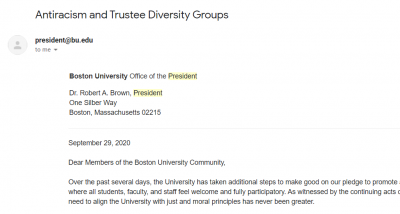
Boston University will introduce two new groups to continue the University’s efforts against racism, President Robert Brown announced in an email to the BU community Tuesday.
The two groups, the Diversity and Inclusion Committee and the Antiracism Working Group, will take initiative to prioritize improving antiracism, diversity and inclusion, according to the email, and will be working with faculty, staff and students to address these issues within BU’s community.
While neither group has begun holding meetings yet, Senior Diversity Officer and AWG Chair Andrea Taylor said the goal of the group is to review current practices across the University to identify bias and create a plan for achieving greater diversity and inclusion.
“A number of schools and colleges and programs have initiated their own independent efforts in this regard, which is terrific,” Taylor said. “One of things that I think the Antiracism Working Group can do is to begin to aggregate those activities and inventory them [and] make an assessment of where we are.”
The first AWG meeting is set to take place this month, and the DIC will release its membership and charter in October as well, according to Brown’s email.
Taylor, a Board of Trustees member, said the Board will determine who will be on staff for the DIC. She said the committee’s creation is “encouraging” and that “a lot of thought and consideration” went into the creation of these committees.
Taylor added that these groups may be able aid in the organization of the University’s work on racism and diversity and “make [it] more visible.” The AWG, Taylor said, plans to develop a framework for action that will also introduce new areas of activity and thinking.
“The current events that have occurred and resulted in a national conversation about the impact and the importance of diversity and inclusion has accelerated this particular activity in some ways,” Taylor said. “But this is an ongoing conversation that the University has been having for a very long time.”
Kecia Ali, a member of AWG by an invitation from Brown, said she believes the members were chosen based on prior experience in addressing questions of racism within their communities.
“The idea is that together, as we move through the review of University practices and policies and procedures,” Ali said, “we will have enough common ground in terms of our goals and enough differences in terms of our backgrounds and our areas of expertise that we’ll be able to have productive and fruitful collaborative conversations.”
Ali, who teaches religion courses in the College of Arts and Sciences, said she would like to see AWG examine how white supremacy operates in classroom curricula and affects the recruitment and retention of students and faculty.
“All of the elements of university life,” Ali said, “are affected in one way or another by the legacies of racist structures as well as their current effect.”
Dean of Students Kenneth Elmore — also a member of AWG — said he has talked to students who are passionate about assisting the University in its efforts against racism and who have raised awareness on issues around ally training, antiracism training and mental health.
While there currently aren’t any student representatives among AWG’s members, Elmore said students should send him their thoughts on issues within BU so that AWG can incorporate them into future work.
“I think that the general goals of the group that Dr. Brown set out should be the goals that everybody should be thinking about,” Elmore said. “And that is to have a place … where we can really examine what we do every day and make sure it’s done in a context where we are trying to ensure that all students can participate in these sorts of things without there being lingering negative effects on their lives, especially if it’s about color.”
Gracie Mae Morey, a junior in the CAS, said she thinks BU is addressing racial injustice well.
“It’s good that BU is bringing racial injustice issues to the table because it’s a very diverse school so it has a lot of people from different backgrounds and cultures and nationalities,” Morey said. “I know that their specific little changes aren’t going to necessarily change the world, but it may change how specific students view specific topics.”
Chloe Liu contributed to the reporting of this article.












































































































